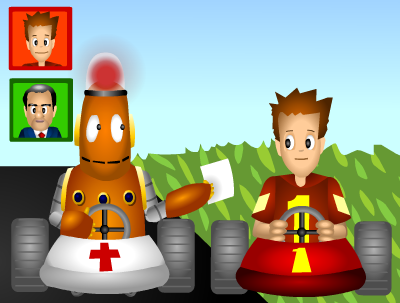
Guest Blog: Why Games Are Effective Educational Tools
Posted by allisyn on
Come join BrainPOP Educator, Adam Coccari, for this Wednesday’s free webinar, for more ideas on how to integrate games into your classroom!
Adam is also developing an educational game for practicing math skills called Math Evolve.
Games for Learning: Why Games Are Effective Educational Tools
by Adam Coccari
I am a 4th and 6th grade teacher that has been utilizing games in my lessons and tutoring sessions for a few years now. If I had suggested just five years ago that video games could play a major part in classroom education, the majority of teachers and school administrators would have laughed at me. Now, there seems to be somewhat of a sea change happening in this field. Educators are starting to believe what many researchers and advocates have long known: Video games can be excellent teaching tools and an effective way for students to learn.
Although games can never replace the role of a teacher, games can accomplish a lot of things that traditional teaching methods can’t. Video games let students simulate historical events and scientific processes and experiment for themselves. Games can help get unmotivated students excited about math and ancient history, and reach students who don’t respond to conventional teaching methods. Aside from just teaching new concepts, video games can get students to apply critical-thinking and problem-solving to subjects they have already learned.
Why Games?
When many people are asked why we should use games in education, they respond with answers like: “Kids love them!” “They are fun!” “Games engage students!” While these statements are true, they don’t tell us much about what makes them good for education. We all know that many kids love video games, but I want to examine the issue more closely to understand how games engage and motivate kids, and why they are good educational tools. Although they are certainly related, I will examine both engagement and motivation separately.
How Games Engage Students:
Kids Feel Themselves Improving: Students become disheartened when they feel overwhelmed by large bodies of information and complex subjects. Most video games break down learning concepts into smaller goals and milestones. This makes the feeling of progress and improvement much more attainable and concrete, and students feel the immediate effects of their improvement as they become better at the game.
Games Provide Instant Feedback: We all know that receiving feedback from teachers about one’s mistakes teacher is a crucial element for effective learning. However it often takes teachers time to grade and return work, and the feedback is not as effective. Games often provide instantaneous feedback to students, allowing them to simply try again and make the necessary corrections or adjustments to their approach. Corrective feedback is necessary for learning, and games provide an easy way to achieve this on an individual level.
Games Create Interactive Experiences: Unlike receiving information passively from a lecture or a book, games allow students to actively interact with the subject matter. Educational games make a learning an active and physical process. Just like playing a musical instrument, combining physical movement and mental energy creates new neural connections and promotes a deeper level of learning. Engaging with the experience of westward expansion using Oregon Trail is ultimately more memorable for kids than reading about it in a textbook because the game is an active experience.
Games Allow Kids to Experience Alternate Realities: Kids love to engage their imagination and play “make-believe,” experiencing fantasy worlds and taking on roles that are more exciting than their real-life existence. Games allow students to do this in a safe and structured way, creating immensely engaging experiences for children. This can be especially powerful in an educational setting. Simulation games let students experience historical periods or imaginary scenarios, helping them gain a better understanding of the time and motivations of the people involved. Players can experiment, make choices, and see the effects of their decisions, turning the abstract concepts that they are learning about into tangible experiences.
How Games Motivate Students:
Some skills in school (like learning the times tables) come to down to pure practice and repetitive drilling. Games can be a great way to motivate students and make these repetitive exercises fun. If you have ever watched a child play a video game for hours on end, you know the immense power that good video games have to motivate people. The intense motivation that games can foster increases students’ time on task, focus, and persistence through difficulties, leading to increased fluency and automaticity. Good educational games can use the same motivational techniques as commercial video games to motivate students, but instead of just entertaining themselves they are practicing math, spelling, or learning about history. Here is a rundown of the best game design techniques used to create engagement and motivation:
Competition: Do not underestimate the power of a a little competition. Kids love to play games in which they get to compete against their friends, family, or other students. The desire to improve and win is a very strong motivator. Timed races, high scores, and leader boards are all great ways that games can include a little competition in the learning experience.
Progression: Being able to progress and grow stronger is one of the most satisfying and motivational aspects of video games, and it is analogous to the ways in which we learn and grow smarter. Many games utilize some sort of progression dynamic in which the players start out at a low “level” with few points or abilities, and then are able to gain points, experience, or currency to progress and reach higher levels. This type of mechanic is a powerful motivator for all people, but works especially well to get kids hooked and engaged with educational content.
Customization: It has been well documented that kids love to customize their characters and avatars within games. Customization makes kids feel much more connected with their character and with the game. My students play a multiplication game on Academic Skill Builders in which they play as little penguins jumping around to solve multiplication questions. It is amazing how just letting the kids choose the color and name of their penguins makes them so much more excited to play the game. Other platforms like the online learning system Mathletics let students customize every aspect of their experience down to the website’s background, colors, and their avatars hairstyle and accessories. By learning math, the students gain access to more customization options. Which leads me to…
Rewards and Unlockable Content: Providing incentives for student performance and time spent on the game is an extremely effective way to keep kids playing an educational game for hours. Games often let players unlock new characters, levels, costumes, or even whole new games by completing tasks or doing well on the educational content. The best games provide students with clear and achievable goals, and then provide rewards as positive feedback for achieving these learning goals. These rewards are powerful motivators that make the games more enjoyable and keep them coming back for more.
For all the reasons I have mentioned, I believe that good educational games can be a fun and powerful way for kids to learn. They cannot replace the importance of a teacher, they are just one of many tools that teachers and parents can utilize to aid in a student’s education. However, there is still a disconnect between the quality of mass-market commercial video games and educational titles. We need educational games that are every bit as fun and compelling as traditional video games. We also need to teach educators and administrators the best way to utilize games effectively and implement them into their schools. This is still a new and growing field, and there is lots of room for improvement, but I am very excited about the potential that games hold for the future of education.
Adam Coccari
Founder, InterAction Education
www.InterActionEducation.com














